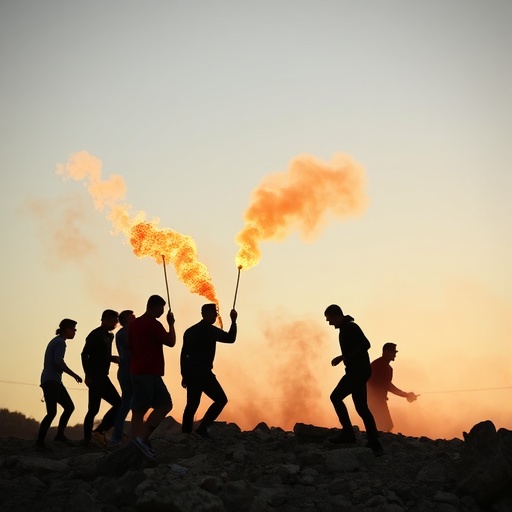As global temperatures continue their upward trajectory due to climate change, the subtle yet profound effects of heat on workplace dynamics are coming under increasing scrutiny. A groundbreaking experimental study conducted by researchers at the University of California San Diego’s School of Global Policy and Strategy reveals a critical and previously underappreciated facet of heat exposure: the marked decline in team productivity, even under relatively mild increases in ambient temperature. This research provides compelling evidence that while individual performance may remain largely resilient to thermal stress, team-based activities—central to modern economic production—suffer disproportionately in warmer conditions.
The study deployed a controlled experiment involving computer science undergraduates in Dhaka, Bangladesh, an urban environment emblematic of rapidly developing economies frequently grappling with inadequate climate control infrastructure. Participants were assigned either to individual tasks or to pairs collaborating on programming challenges, conducted under regulated environmental conditions of 24°C (75°F) and 29°C (84°F). This methodological rigor allowed researchers to isolate the variable of temperature while maintaining consistency in task complexity and participant demographics.
Intriguingly, individuals demonstrated consistent performance irrespective of the increase from 24°C to 29°C, suggesting a robustness in solitary cognitive engagement under mild heat stress. However, the unit of analysis shifted dramatically when examining pairs working collaboratively. Teams exposed to higher temperature conditions exhibited a notable downturn in overall productivity, indicating that elevated heat exerts a differential and deleterious impact on group dynamics rather than individual capacity alone.
Delving deeper into the behavioral mechanisms underpinning this phenomenon, coauthor Teevrat Garg, an associate professor of economics, elucidated the breakdown in interpersonal communication and engagement triggered by heat. According to Garg, thermal discomfort tends to augment irritability and reduce patience, thereby eroding cooperative impulses essential for collaborative problem-solving, creativity, and innovation. The study compellingly situates social interaction as a critical bottleneck impaired by environmental stressors, rather than purely individual cognitive decline.
The research further highlights the heterogeneity of heat effects within team dynamics, emphasizing that coordination challenges are particularly exacerbated in groups with diverse compositions. Teams with varied gender representation or disparate academic standings reported amplified dissatisfaction with their partners and expressed a stronger inclination to alter collaborators for subsequent tasks when subjected to warmer rooms. These findings underscore the complex interplay between social structures and environmental stress, revealing how temperature can intersect with underlying social tensions to hinder effective collaboration.
Contrastingly, under the baseline temperature setting of 24°C, teams not only sustained but enhanced productivity, frequently outperforming individuals. The tendency for teams at normal temperature to incorporate new features into their programming code was nearly double that of solitary participants, illustrating the additive benefits of cooperative work absent environmental disruption. This juxtaposition accentuates how optimal ambient conditions function as a catalyst for synergistic team output.
This empirical evidence carries potent implications for developing economies such as Bangladesh, where burgeoning knowledge industries are simultaneously met with infrastructural challenges including limited access to climate-controlled workspaces. The accelerating pace of economic growth in these regions predicates the adoption of team-based work models, amplifying the urgency to acknowledge and mitigate environmental factors that can silently erode productivity gains essential for sustainable development.
Elizabeth Lyons, coauthor and associate professor of management, advocates for organizational responsiveness to these findings. She argues that investments in climate control technologies—air conditioning, ventilation, and thermal regulation—are not merely comfort enhancements but strategic imperatives that can safeguard collaborative efficiency and innovation capacity. Proactively managing environmental conditions emerges as a critical lever for optimizing human capital in hot climates and protecting against the insidious productivity losses documented.
The study also resonates with broader industrial trends in developed economies. In the United States, for instance, 78% of employment in 2017 was situated within occupations where teamwork was deemed ‘very’ or ‘extremely’ important. As such, any factor impairing group collaboration, including thermal stress, could reverberate widely across economic sectors. This linkage between environmental health and economic vitality mandates renewed attention from policymakers and business leaders alike.
Conducted with methodological rigor and real-world relevance, this research bridges a significant gap in the literature on the intersection of climate and labor economics. Prior investigations largely focused on individual productivity declines owing to heat exposure, but this study uniquely centers on the social and cognitive dimensions of teamwork, highlighting a novel channel through which climate change may compromise economic output.
The experiment was carried out with the support of multiple institutional entities within UC San Diego, including the Policy Design and Evaluation Lab and the Cowhey Center for Global Transformation. Such interdisciplinary backing underscores the complexity and importance of integrating environmental science with social and economic analysis to address pressing challenges on both local and global scales.
As the world confronts escalating heatwaves and temperature anomalies wrought by climate change, this research sounds a clarion call for holistic workplace adaptation strategies. Enhanced climate control infrastructure, thoughtful organizational design, and recognition of environmental determinants of social interaction may together safeguard the creativity and innovation that underpin modern economies. Without such measures, rising temperatures threaten not only physical health but also the collaborative foundations of economic progress.
Subject of Research: People
Article Title: Heat and Team Production: Experimental Evidence from Bangladesh
News Publication Date: 26-Jun-2025
Web References:
- Full Study: https://papers.ssrn.com/sol3/papers.cfm?abstract_id=5234644
References: The Review of Economics and Statistics
Keywords: Social research, Business, Economics, Team productivity, Heat exposure, Workplace dynamics




